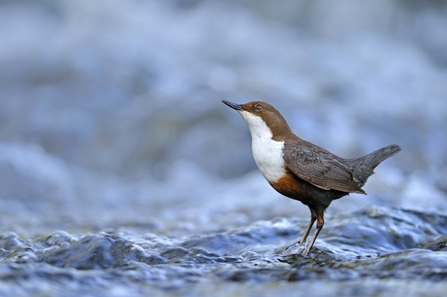Unlike any other British songbird, dippers are uniquely built for an amphibious lifestyle. They can stay submerged for up to 30 seconds, walking along the riverbed in search of aquatic insects and small fish. To achieve this, they stretch out their wings to balance themselves against the current, while transparent eyelids act as built-in goggles, allowing them to see underwater with perfect clarity. Their dense plumage provides insulation, and a special gland near the base of their tail produces waterproofing oils to keep them dry.
Dippers are highly territorial and form strong pair bonds during the breeding season. They construct nests near water, often tucked into rock crevices or behind waterfalls. A particularly astonishing record from Scotland revealed that one dipper nest site has been used continuously for an incredible 123 years! While pairs frequently return to the same location, they usually rebuild their nests at the start of each breeding season. Their domed nests, made of moss and grass, are carefully positioned with the entrance facing downward toward the water, ensuring maximum protection from predators.

